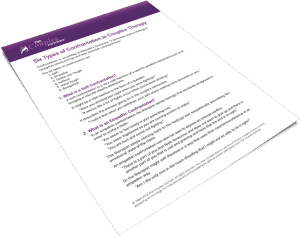
Discover How to Get To The Truth Faster With Six Types of Effective Confrontations
[/text_block]
(Even if you have really challenging couples situations, you know they are lying to you, and/or you don’t want to alienate one or both partners.)
[/text_block]

Six Types of Confrontation
In this guide I focus on six types of confrontations: soft, empathic, gentle but tough, indirect, hard/tough, and bombshell. I hope you'll be able to review the types with examples I provide and begin to use them with your couples. The different types of confrontation are appropriate for different clients and stages of couples therapy. Each type of confrontation is more assertive than the last, so you can use them in a sequence of increasing intensity. Or you can back off to a less intense type when a client resists or regresses. I look forward to sharing more with you in the coming days.[/text_block]
When trying to confront your couple and/or one partner, you may feel:

- torn between understanding how hard it is to tell the entire truth to their partner at times, and understanding how damaging ongoing lies can be.
- empathy for both parties, but that also slows the confrontation down.
- being frustrated that even when you confront them on the lie they still do not want to admit the truth.
- not confident in tackling mistruths in a less confrontational manner – or how to ask for more transparency.
- unsure of whether to confront them individually or in the couples session.

So, with all of these possible situations, it can be hard to feel secure in your choices of interventions.
Whether you’re trying to diagnose what you should do next at a certain stage, or get the confidence you need to take control of the sessions – it doesn’t matter – I can help you work with couples efficiently and effectively using strategies that have helped hundreds of therapists and thousands of their couples around the world.
Based on where you are right now, what you want to do is find a solution that specifically addresses your unique situation.

Ideally you want a resource that walks you through many of the steps you need to take next. For example:

- How to delineate each partner’s goals and keep them on track – while giving them feedback in a way that will not be taken as criticism or judgment.
- How to assess motivation at the start to see what is needed.
- How to move conflicted couples into each seeing their own contribution.
- Trusting yourself; how to be less nervous, stay present in the moment like you are good at doing with your individual clients.
- Creating a solid treatment plan and helping couples establish clear goals.

Hi, I'm Dr. Ellyn Bader.
I am the co-founder and co-director of The Couples Institute and co-creator of The Developmental Model of Couples Therapy, with my husband, Dr. Peter Pearson. When we created the Developmental Model over 30 years ago, it helped launched the specialty of couples therapy. It has not only withstood the test of time, but all of the strategies and interventions are built upon the Developmental Model of Couples Therapy, which I created with my husband.But it wasn’t always easy, and I really struggled working with couples when I first started. In fact, I probably wasn’t doing some of the couples any favors, and maybe worse.
I want to give you the tools and strategies I’ve learned so that it won’t take you years to discover them. After helping thousands of therapists like you, I know I can help you, too.


In Affairs in Couples Therapy, you’ll learn specific aspects of diagnosis and treatment:
[/text_block]
- How to evaluate the meaning of an affair.
- Some core treatment issues in the initial, middle and termination stages of treatment.
- The value of obsessing about an affair and its details.
- What obsessing about an affair does and does not accomplish.
- How to organize what you know about the couple into a treatment plan.


Downloadable MP3 audio of the session


PDF copy of the Transcript


Get Affairs in Couples Therapy
Price: $40
[/text_block]
 “I feel a sense of empowerment that I’ve never felt before, and that means everything when doing the difficult work of couples therapy.”
“Ellyn has helped me to become a competent couples therapist. Working with couples can be anxiety provoking. You never know what you are going to be confronted with and how someone is going to react to what their partner might say or do.
I now feel confident and grounded in knowing that I have many options on how to manage hostile-angry and conflict-avoidant couples. I feel a sense of empowerment that I’ve never felt before, and that means everything when doing the difficult work of couples therapy.”
“I feel a sense of empowerment that I’ve never felt before, and that means everything when doing the difficult work of couples therapy.”
“Ellyn has helped me to become a competent couples therapist. Working with couples can be anxiety provoking. You never know what you are going to be confronted with and how someone is going to react to what their partner might say or do.
I now feel confident and grounded in knowing that I have many options on how to manage hostile-angry and conflict-avoidant couples. I feel a sense of empowerment that I’ve never felt before, and that means everything when doing the difficult work of couples therapy.”
Elany Mueller, LMFT Pasadena, California











 We respect your privacy,
We respect your privacy,